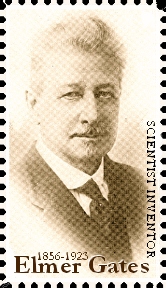
Elmer Gates (1859-1923)
"I hope I will not irritate the philosophers of
the past and construct a system of philosophy because of my special
contributions to it. I hope I will have the courage to add my mite and let
it go at that." - Elmer Gates
Read 238
notes and quotes Bill excerpted from Elmer Gates and the Art of
Mind-Using, click on the stamp, above.
|
Like the Emeralda Region itself, the Gates Prize for
Great World Teaching is a fantastic idea, an imaginary award for an
imaginary world. I
created the imaginary place and then I created the imaginary award to get
me there. So it was in 1996 that I first won the Gates Prize. Yes, I
awarded it to myself!
I believe others can "win", too; but to
win, they must first learn about Elmer Gates. Who knows? As I heard
someone say once, you may already be a winner.
I came across Elmer Gates' name in a book by Napoleon Hill
titled Think and Grow Rich. Hill was explaining the value of concentration
and a focused mind, and the kinds of discipline and vision that go with
invention, creativity and discovery. He used Elmer Gates as an example.
Elmer Gates (1859-1923) was a pioneering neuroscientist.
A child prodigy, he was home-schooled and self-taught in many disciplines. By 1900 he had achieved considerable notice and was sought out
for his theories of "mind-growing," i.e., the idea that a person
could develop more brain cells by self-discipline and meditation.
He proved is theory not only by empirical
experimentation but by inventing numerous practical devices himself. The US Patent Office awarded him about 200 patents for his
inventions. He knew a number of other leading innovators in his day such
as Edison, Ford, and others.
Elmer Gates became more
interested in education in his later years since he determined that
learning was the core of his mission in life. He called his discipline The
Art of Mind-Using.
He envisioned a world school and a cadre of world
teachers. Sadly, his mission was doomed to fail in part because he was not a business man and there was no partner to help him carry on his life work. That is, except for one. His works would have been lost except for the aid of a loyal, dutiful sister-in-law who saw to it that his records were organized and saved.
But in the sad ending of his life he was alone and bankrupt. He died with
only his loyal help mate, Pearlie, beside him.
Late in the 20th Century ( now a hundred years after
Elmer Gates envisioned his new school) I had been thinking there should be a prize
for great teachers who may have shared his vision - something on the order of the Pulitzer or Nobel
prize.
This idea imprinted itself on my mind. I
gave a name to this imaginary prize: The Gates Prize, but
actually that was before I'd heard of Elmer Gates. I was thinking
locally of the
Gates family living in my own part of the country, the Bill Gates of Microsoft
fame.
But of course it would be embarrassing ( or worse, people
warned me) to use the Gates' name without the family's knowledge. So when I
happened to find the older Gates in Napoleon Hill's book, I adopted
Elmer Gates' name instead.
It was with amazement that I read Elmer Gates' biography (Elmer Gates
and the Art of Mind-Using -a rare book written by his son, Donald). I thought his pioneering work pointed more
clearly to education than even that of our local hero at the time. But
it was soon after,
however, the family created the historic Bill and Melinda Gates Foundation, which
is the world's largest
endowment for education.
The Gates Prize is part of my Emeralda Suite of games
I'm inventing. I
call these Games for the Gifts of Life, a key element in the background
story for my wishful, dream-like imaginary place, Emeralda Region, where teachers, learners,
researchers, practitioners and community servants would be invited to live and
work for 360 days in a community of other winners like themselves.
The Emeralda Region, with its four cities bordering a huge lake, is like a huge artist's retreat or colony.
Ten "islands-of-domains-of-expertise" dot the lake. I call the
region a communiversity,
and that is where my imagination takes me. You may follow my path
through the Stamps 'N Stories series.
Bill H. Ritchie, Jr. ITinerate
Professor of Art
Emeralda Inventor
Twelve-time winner of the Gates Prize
|
